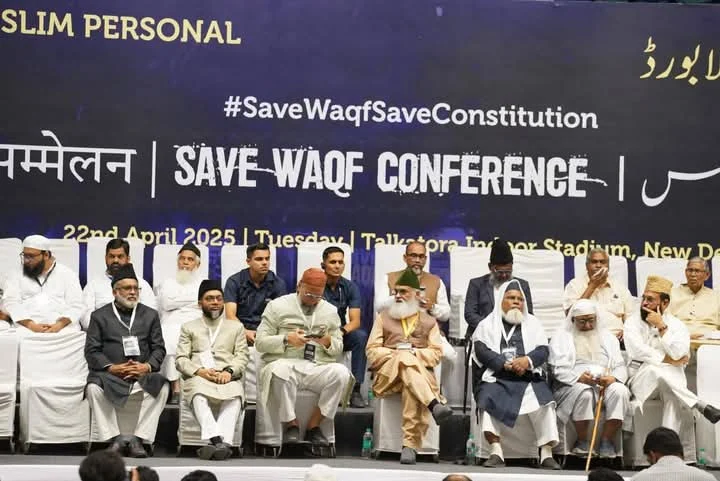By Anwarulhaq Baig |
New Delhi: The All India Muslim Personal Law Board (AIMPLB) has filed a sharp rejoinder in the Supreme Court, dismissing the Union Government’s defense of the Waqf Amendment Act, 2025, as both factually inaccurate and legally unsustainable.
The apex court is currently hearing the matter.
Filed over the weekend in the Supreme Court by AIMPLB General Secretary Maulana Mohammad Fazlurrahim, the rejoinder takes direct aim at the Centre’s counter-affidavit, alleging that it misrepresents both legal precedents and statistical data on waqf properties.
AIMPLB spokesperson Dr. S.Q.R. Ilyas confirmed that the petitioners are seeking an immediate stay on the amendments, which they argue violate constitutional protections.
Challenging the ‘No Stay on Statutory Laws’ Argument
AIMPLB’s rejoinder pushes back strongly against the government’s assertion that constitutional courts cannot stay statutory enactments. The rejoinder cites several landmark rulings—including those related to OBC reservations, the Maratha quota, and the farm laws—where the apex court has intervened to suspend statutory provisions that impinged on fundamental rights.
The Board argues that the presumption of constitutionality is merely a rule of evidence, not an impenetrable shield. “Where Articles 14, 19, 21, 26, 29, and 30 are involved, judicial review cannot be brushed aside,” it states.
Exposing Alleged Data Manipulation
One of the key flashpoints in AIMPLB’s rebuttal is the government’s use of data from the Waqf Asset Management System of India (WAMSI) portal. The Centre claimed a sharp increase in waqf properties—from 330,008 in October 2024 to over 665,000 in 2025. The Board dismisses this as “double counting” and “statistical manipulation,” accusing the government of artificially inflating the figures by misclassifying multiple properties within a single waqf estate as separate entries.
“The term ‘number of properties’ used by the government is misleading,” AIMPLB argues, stating that the WAMSI portal itself disaggregates composite waqf estates into smaller components, resulting in an exaggerated total.
Critical View on Mandatory Registration and ‘Waqf by User’
AIMPLB also takes issue with the removal of the long-standing principle of ‘waqf by user’ and the imposition of a new requirement for formal registration. The Board says these changes target informal religious sites—mosques, dargahs, and graveyards—which have functioned for generations without written deeds. The amendment, it argues, imposes an undue burden on such waqfs, unlike other religious endowments that are not subject to the same rigid formalities.
Objection to Government Oversight and Inclusion of Non-Muslims
The Board has raised concerns over provisions like Sections 3B, 3C, and 3D of the amended Act, which grant government authorities wide powers over waqf properties. Section 3C, in particular, allows the state to declare any waqf land as non-waqf if it overlaps with government claims. AIMPLB argues that this effectively lets the government act as “judge in its own cause,” with little to no judicial oversight.
Further controversy surrounds the mandatory inclusion of non-Muslim members in Waqf Boards and the Central Waqf Council. According to AIMPLB, this undermines the Muslim community’s right to self-govern its religious institutions.
5-Year Religious Practice Condition
Another contentious provision is the requirement that waqf donor must have practiced Islam for at least five years. The Board claims this is legally unsound and constitutionally suspect. It argues that such a test lacks precedent and runs contrary to the evolving jurisprudence on freedom of religion and conscience under Article 21. “The essential practices doctrine is being misused,” the rejoinder notes, citing Supreme Court rulings like Puttaswamy and Navtej Singh Johar to underscore that dignity and autonomy have taken precedence over rigid religious tests.
Use of Monument and Archaeological site Act to Deny Waqf Status to Mosques
The petition also objects to Section 3D of the new law, which voids waqf declarations for properties falling under the Ancient Monuments and Archaeological Sites and Remains (AMASR) Act. AIMPLB contends that the original religious character of mosques—once established—cannot be erased, even if the structure is later classified as a protected monument.
Shrinking Muslim Representation in Waqf Bodies
The Board expressed alarm over reduced Muslim representation in both the Central Waqf Council and State Boards. Under the amended law, the number of Muslim members is slashed while space is created for non-Muslims and government nominees. AIMPLB claims this reflects a deep-rooted distrust in the Muslim community’s ability to manage its own religious affairs.
Before the amendment, the Central Waqf Council had 20 Muslim members out of 21; it now has just 7 Muslims out of 22, with 10 members left unspecified. The composition of State Waqf Boards has also changed from all-Muslim, elected bodies to potentially majority non-Muslim, nominated ones.
Flawed JPC Process and Night-time Passage of Bill
AIMPLB also criticized the legislative process that led to the law’s passage. It alleges that the Joint Parliamentary Committee (JPC) scrutinized the bill in haste, sidelining dissenting voices. The final bill was passed during late-night parliamentary proceedings between 11 PM and 2:40 AM—circumstances the Board says raise questions about procedural fairness.
As the Supreme Court prepares to hear the case, the AIMPLB maintains that the Waqf Amendment Act, 2025, poses a serious threat to minority rights and religious freedom in India. The petitioners hope the Court will not only stay the law but also strike it down as unconstitutional.

